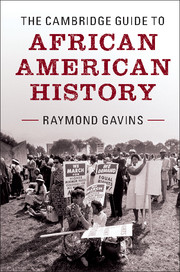Book contents
Preface
Published online by Cambridge University Press: 05 March 2016
Summary
Scholarly accounts of blacks date from the 1880s, owing especially to black Union veteran and legislator George Washington Williams's History of the Negro Race in America from 1619 to 1880 (two volumes, 1882). Black scholars W. E. B. Du Bois and Carter G. Woodson made vital contributions. Du Bois formed the Atlanta Conference of Negro Problems, publisher of nineteen Atlanta University Studies (1896–1917), including The Negro Church (1903) and The Common School and the Negro American (1911). Edited mostly by Du Bois, those works enlarged blacks’ scholarly foundations. The “Father of Black History,” Woodson founded the Association for the Study of Negro Life and History (1915), Journal of Negro History (1916), Associated Publishers (1921), Negro History Week (1926), and Negro History Bulletin (1937). Publishing many books, Woodson and his associates firmly shaped Negro history long before the Brown v. Board of Education decision of 1954 disallowed segregation in education.
The Civil Rights, Black Power, women's, Hispanic, Indian, and other rights movements in the 1960s influenced colleges, universities, and schools’ consent to create black, minority, and women's courses and programs. Intersecting the New Social History, which integrated nonelite and marginalized people, African American history increasingly gained recognition in historical scholarship and proceeded apace. It now stands at the cutting edge of studies of not only black experiences from slavery to contemporary times but also race, ethnic, gender, and class relations and the state, politics, and culture in the United States, African diaspora, Atlantic World, and across the globe. Blacks and women “are so essential to American history that it is perverse to think of it without them,” Nathan I. Huggins stated in 1986, assessing their roles in the “new social history” and the “reconstruction of American history.” Race, ethnicity, class, gender, and injustice were contexts “whereby previously mute and unsummoned witnesses could offer testimony” (Huggins, 1986, p. 157). With blacks and women paving the way, more and more natives and immigrants, working and underclass groups of color began gaining visibility in historiography. Historiographies of slavery, abolition, racism, colonialism, decolonization, and national independence in the African, Atlantic, and global world appropriate African American themes of agency, freedom, civil and human rights, too. Gerald D. Jaynes, ed., Immigration and Race: New Challenges for American Democracy (2000) and Mary L. Dudziak, Cold War Civil Rights: Race and the Image of American Democracy (2000) attest to such relationships.
- Type
- Chapter
- Information
- The Cambridge Guide to African American History , pp. xiii - xviPublisher: Cambridge University PressPrint publication year: 2016



